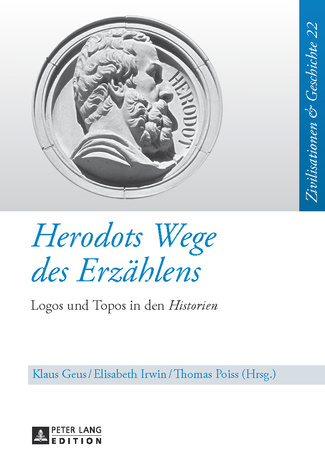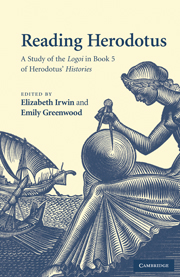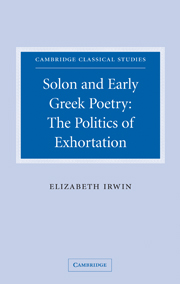Elizabeth Irwin
Associate Professor of Classics
(212) 854-5684
ei42@columbia.edu
617D Hamilton Hall
Office hours: Fridays, 12:30 p.m.–1:30 p.m., or by appointment.
Research Interests
Herodotus
Thucydides
Old Comedy
Political and Ethical Debates of the later Fifth Century
Athenian Empire
Historicizing readings of Athenian Drama and of Plato
Archaic Greek Poetry and History
Pindar and Bacchylides
The Reception of Classical Athens in Greek Writers of the Imperial Period (Augustan and later)
Brooklyn-born Elizabeth Irwin first began studying Classics at Columbia College (B.A., 1988–91) after discovering the School of Engineering and Applied Science (1987–88) was not where she was meant to be. Fellowships from Columbia, Oxford, and Cambridge enabled her to obtain further degrees in Classics from Oxford (B.A./M.A., 1991–94) and Cambridge (Ph.D., 1995–99). She has held post-doctoral research fellowships and an affiliated lectureship at the University of Cambridge, having also taught in lectureships at Oxford and Reading. After 14 years in the UK, she returned to the U.S. in 2005 to take up a position at Columbia, receiving tenure in 2013.
Her first book, Solon and Early Greek Poetry: The Politics of Exhortation (Cambridge 2005), studies the intersection of early Greek hexameter poetic traditions with archaic poetic and political culture as found in the early Greek elegists, with a particular emphasis on Solon. She continues to work on archaic poetry and political culture; but has also turned increasingly to the literature and history of the fifth century, focusing on texts and issues dealing with the Athenian empire. She has co-edited with Emily Greenwood a volume on Herodotus, Reading Herodotus: the Logoi of Book 5 (Cambridge 2007), and with Thomas Poiss and Klaus Geus, Herodots Wege de Erzählens (Frankfurt am Main: Peter Lang 2013). She has written numerous articles on Herodotus and Thucydides and is currently writing on Herodotus’ Histories relationship to the Atheno-Peloponnesian War and to Thucydides, proposing ultimately a date for our Histories later than the end of the Atheno-Peloponnesian War. She is editing a conference volume with Thomas Harrison with OUP about Herodotus in his contemporary context (expected date 2018) and also has a number of books and articles underway dealing with political and historical readings of Athenian comedy, Pindar, Prodicus, Plato, and Dionysius of Halicarnassus.
Since coming to Columbia, she has been awarded research fellowships by the Alexander von Humboldt Stiftung, Humboldt Universität, Berlin (mid-2009–10, 2011), the Center for Hellenic Studies (2008–09), and the Loeb Classical Library (2008). Most recently, she spent a semester (Spring 2015) at the American School of Classical Studies through a Fellowship from the National Endowment of the Humanities. In 2017–18, she will be a Visiting Fellow at Clare Hall and the Classics Faculty at Cambridge.
Selected Publications
Books and co-edited volumes
Herodots Wege des Erzählens (ed. with Klaus Geus and Thomas Poiss). Frankfurt am Main: Peter Lang, 2013
Reading Herodotus: A Study of the Logoi in Book 5 of Herodotus' Histories (ed. with Emily Greenwood). Cambridge: Cambridge UP, 2007
Solon and Early Greek Poetry: The Politics of Exhortation. Cambridge: Cambridge UP, 2005
Articles
Forthcoming
‘Debating the happiness of Periclean Athens: from Herodotus’ Solon to its legacy in Aristotle’, Acta Classica Supplement
‘Just why did Cambyses conquer Egypt (Hdt. 3.1-3)? A study of narrative, explanation and ‘history’ in Herodotus’ Cambyses logos’, in R. Rollinger (ed), Weltbild und Welterfassung zwischen Ost und West / Worldview and World Conception between East and West. Proceedings of an international conference in honor of Reinhold Bichler, held in Obergurgl, Tyrol, 19-22 June, 2013. Classica et Orientalia (Harrasowitz Verlag, Wiesbaden)
2015
‘Dionysius of Halicarnassus’ On Thucydides and Thucydides’ rhetoric of the episodic’, in C. Werner, A. Dourado-Lopes, E. Werner (eds), Tecendo narrativas: unidade e episódio na literatura grega antiga (São Paulo), 121-199
‘The nothoi come of age? Illegitimate sons and political unrest in late fifth-century Athens’, in P. Sänger (ed) Minderheiten und Migration in der griechisch-römischen Welt: Politische, rechtliche, religiöse und kulturelle Aspekte (Schöningh Wissenschaftsverlag: Paderborn), 75-122
‘The Platonic Axiochus: the politics of not fearing death in 406 BC’, in S. Gotteland and S. Dubel (eds), Genres, formes et cadres du dialogue antique (Ausonius: Bordeaux), 63-85
2014
‘Ethnography and empire: Homer and the Hippocratics in Herodotus’ Ethiopian logos, 3.17-26’, Histos 8: 25-75
2013
‘The hybris of Theseus and the date of the Histories’, in K. Ruffing and B. Dunsch (eds), Source References in Herodotus – Herodotus’ Sources: Conference in memoriam Detlev Fehling, Classica et Orientalia (Harrasowitz Verlag, Wiesbaden) 7-93 (Rev. BMCR 2015.2.4)
‘The significance of Talthybius’ wrath’, in K. Geus et al (eds), Wege des Erzählens: Logos und Topos bei Herodot (Peter Lang) 223-60
‘To whom does Solon speak? Conceptions of happiness and ending life well in the later fifth century (Hdt. 1.29-33)’, in K. Geus et al (eds), Wege des Erzählens: Logos und Topos bei Herodot (Peter Lang) 261-321
2012
‘Bacchylides 17: Theseus, Minos and Delian League ideology’, Hyperboreans: Essays in Greek and Latin Poetry, Philosophy, Rhetoric and Linguistics (Humanitas, São Paulo) 51-102
2011
‘Herodotus and Aeginetan identity’, in D. Fearn (ed), Aegina: Contexts for Choral Lyric Poetry (OUP) 373-425
‘“Lest the things done by men become exitêla”: writing up Aegina in a late fifth-century context’, in D. Fearn (ed), Aegina: Contexts for Choral Lyric Poetry (OUP) 426-57
2009
‘Herodotus and Samos’, Classical World 102: 395-416
2007
‘‘‘What’s in a name?” and exploring the comparable: onomastics, ethnography, and kratos in Hdt. 5.1-2 and 3-10’, in Reading Herodotus (above) 41-88
‘The politics of precedence: first historians on first thalassocrats’, in R. Osborne (ed), Debating the Athenian Cultural Revolution: Art, Literature, Philosophy and Politics 430-380 B.C. (CUP) 188-223 (rev. Sehepunkte 11 (2011), Classical Review 60 (2010) 172-4, Journal of Hellenic Studies 129 (2009) 185-6)
2006
‘The transgressive elegy of Solon’, in A. Lardinois and J. Blok (eds), Solon of Athens: New Historical and Philological Perspectives (Brill) 36-78 (rev. BMCR 2007.4.26)
2005
‘Gods among men? The social and political dynamics of the Hesiodic Catalogue of Women’, in R. Hunter (ed), The Hesiodic Catalogue of Women: Constructions and Reconstructions (CUP) 35-85 (rev. Greece and Rome (2007) 111-12, BMCR 2006.10.3, CR 56 (2006) 275-6, Journal of Hellenic Studies 126 (2006) 151-3)
1998
‘Biography, fiction and the Archilochean ainos’, Journal of Hellenic Studies 118: 177-83



